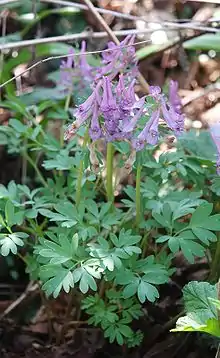Corydalis solida
Corydalis solida, the fumewort, is a species of flowering plant in the family Papaveraceae, native to moist, shady habitats in northern Europe and Asia. Growing to 25 cm (10 in), it is a spring ephemeral, with foliage that appears in spring and dies down to its tuberous rootstock in summer. It is cultivated for its deeply divided, ferny leaves and narrow, long-spurred flowers which appear in spring. The flowers show color variation, and may be mauve, purple, red, or white.[1]
| Corydalis solida | |
|---|---|
 | |
| Scientific classification | |
| Kingdom: | Plantae |
| Clade: | Tracheophytes |
| Clade: | Angiosperms |
| Clade: | Eudicots |
| Order: | Ranunculales |
| Family: | Papaveraceae |
| Genus: | Corydalis |
| Species: | C. solida |
| Binomial name | |
| Corydalis solida | |
| Synonyms | |
|
Corydalis halleri (Willd.) Willd. | |
Systematics
The species was originally named in 1753 by Linnaeus as the variety solida of his Fumaria bulbosa. It was raised to the species F. solida by Philip Miller in 1771. Its current assignment to the genus Corydalis was made by Joseph Philippe de Clairville in 1811.[2]
Four subspecies are recognized:[2]
- C. solida subsp. incisa Lidén
- C. solida subsp. longicarpa Lidén
- C. solida subsp. solida
- C. solida subsp. subremota Popov ex Lidén & Zetterlund

- C. solida subsp. incisa[3] (pale purple flowers) has gained the Royal Horticultural Society's Award of Garden Merit.
References
- RHS A-Z encyclopedia of garden plants. United Kingdom: Dorling Kindersley. 2008. p. 1136. ISBN 978-1405332965.
- Lidén, Magnus & Zetterlund, Henrik (1997). Corydalis : a gardener's guide and a monograph of the tuberous species. Pershore, UK: AGS Publications. ISBN 978-0-900048-66-1. pp. 40-47
- "Corydalis solida subsp. incisa". RHS. Retrieved 12 April 2020.
External links
| Wikimedia Commons has media related to Corydalis solida. |
- Distribution map at Virtuella floran